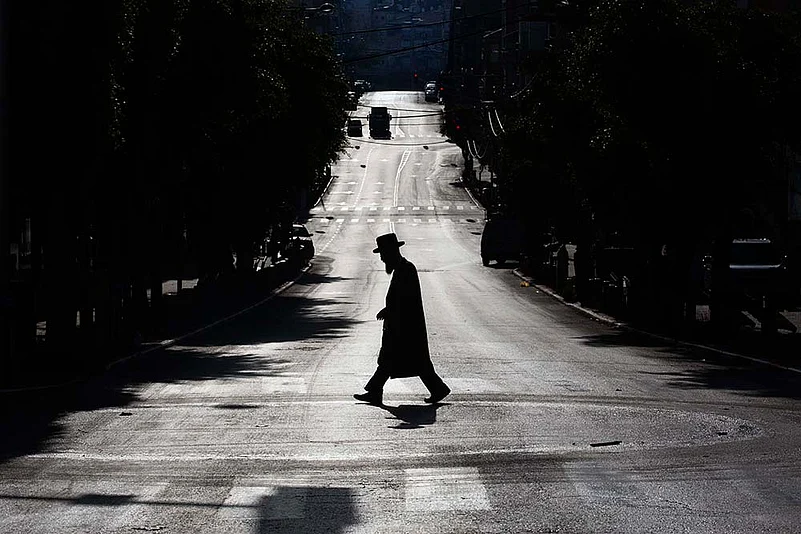Life is not a picnic party; nor does it fit into that doctrine loved by American self-help books: I’m OK, you’re OK. Instead, it surprises us, shocks us; and as we pass through its puzzling curves, we realise that the ‘taken-for-granted world’—or what phenomenologists regard as our ‘paramount reality’—can crumble so quickly. And then, we experience ‘shock’. Yes, as the coronavirus haunts our collective consciousness, we find ourselves in a world where fear is normal, surveillance is legitimate, human interactions are prohibited, and ‘distancing’ becomes the new discourse. What then becomes of the meaning of existence? Is it only about chronic fear, isolation and stigmatisation of those who fall victim? Is it only about the desperate urge to be biologically alive, with masks and sanitisers, yet aesthetically and spiritually dead? Is life only about a survival strategy, or a set of techniques, or using the appropriate apps to ‘work from home’?
To begin with, it is important to acknowledge that modernity has not prepared us to derive a meaning of dignified existence—particularly, amid existential uncertainty. Instead, with its triumphant agenda, it has made us believe that life is an expressway—a smooth road to speedy but endless ‘progress’ that can be measured with absolute mathematical precision. Everything, in this vision, can be predicted and controlled—biomedicine and diagnostic technologies can even postpone death. And all the metaphysical or spiritual riddles we have are just psychic obstacles to be overcome for sustaining a technologically controlled ‘order’. Hence, under ‘normal’ circumstances, as children of modernity all of us inhabit this zone: we seek and participate in the physical/vital/mental pleasures in this ‘taken-for-granted world’.
Today, it’s that modernist myth of ‘certainty’ that is shattered, and we are shattered along with it. We do not know how to live meaningfully amid this uncertainty when anytime the coronavirus, as we fear, can enter our gated communities. And with the breakdown of the illusory notion of ‘safety’—in a ‘risk society’, there is no ‘winner’—we may soon find ourselves coughing and breathing with great difficulty, and realise that death, far from being a mere statistical abstraction, is here awaiting us.
And accept it—modernity has failed to prepare us to deal with that truth. Of our mortality. As proud ‘conquerors’ gifted with Baconian science, Cartesian rationality and the gospel of unlimited techno-economic growth (shared by capitalists as well as socialists), we have only learned to master the ‘outer’ domain. Our inner life had already either stopped its motions—or ceased to interest us. No wonder, as the vitality of the ‘outer’ ceased during the lockdown, many of us are experiencing severe boredom, a sense of void, or some sort of psychic nausea.
What we seek to replace it with is empty stimulants...watching toxic television channels or deriving some sort of vicarious pleasure in sending a WhatsApp message regarding the mythical (but similarly exteriorised) world of celebrities—say, what Deepika Padukone is cooking for Ranveer Singh. These empty gestures have become our route to escape from the interiority of existence. The more we escape, the more wounded we become.
It is in this context that I wish to make two points. First, we can redefine the meaning of existence only if we see beyond our ‘modernist’ selves, and rediscover ourselves as humble wanderers. This is to realise that there is an inherent uncertainty in existence, and not everything can be controlled. This is to come to terms with the mystery of existence. No, this is not fatalism. As a matter of fact, this is a subtle mode of living that unites science and spirituality, light and shadow, the creative zeal of agency and the art of surrender, and technology and poetic mysticism.
Yes, one day the vaccines will come, and hospitals will be equipped with sufficient ventilators to declare the ‘war’ against coronavirus victorious; but then, the infinite domain of uncertainty will continue to surround our existence. With this acknowledgement, we would regain what as ‘moderns’ we have almost forgotten: a sense of gratitude and wonder.
Second, it is important realise that modernity has only activated the psychology of illusory living by confusing the temporal with the eternal—by pretending that the temporal is eternal—and by confusing stimulant pleasures with the real substance of existence. However, at this turning point, when all the arrogant assertions of modernity are crumbling in front of the invisible virus, it is desirable to reflect on a more nuanced art of living by acknowledging and understanding death—the way, say, Nachiketa in the Katha Upanishad sought to live by knowing death, or the way Buddha, at the moment of his death, asked his disciple Ananda not to mourn as everything that is temporal and physical passes away. This is not life-negating pessimism. Nor is it akin to what the European existentialists regard as the ‘absurd’. This is real living. This is, to borrow Thich Nhat Hanh’s meditative expression, absolute mindfulness: the ability to live here and now with absolute intensity. And to live intensely is to die gracefully—the way a tiny blue flower blooms, radiates its fragrance, and then withers away.
Beyond sanitisers and masks—are we ready for this inner churning?
(Avijit Pathak is Professor of Sociology at JNU, New Delhi)
















